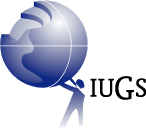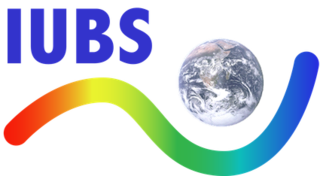Related Research Articles
The United Nations Convention to Combat Desertification in Those Countries Experiencing Serious Drought and/or Desertification, Particularly in Africa (UNCCD) is a Convention to combat desertification and mitigate the effects of drought through national action programs that incorporate long-term strategies supported by international cooperation and partnership arrangements.

The International Union of Geological Sciences (IUGS) is an international non-governmental organization devoted to international cooperation in the field of geology. As of 2023, it represents more than 1 million geoscientists around the world.

The International Union of Biological Sciences (IUBS) is a non-profit organization and non-governmental organization, founded in 1919, that promotes the biological sciences internationally. As a scientific umbrella organization it was a founding member of the International Council for Science (ICSU).

Joggins is a rural community located in western Cumberland County, Nova Scotia, Canada. On July 7, 2008 a 15-km length of the coast constituting the Joggins Fossil Cliffs was officially inscribed on the World Heritage List.
The International Social Science Council (ISSC) was an international non-governmental organization promoting the social sciences, including the economic and behavioural sciences. Founded in 1952, the organization was based out of UNESCO headquarters in Paris, France.
The United Nations General Assembly declared 2008 as the International Year of Planet Earth to increase awareness of the importance of Earth sciences for the advancement of sustainable development. UNESCO was designated as the lead agency. The Year's activities spanned the three years 2006–2009.
The Geological Association of Canada (GAC) is a learned society that promotes and develops the geological sciences in Canada. The organization holds conferences, meetings and exhibitions for the discussion of geological problems and the exchange of views in matters related to geology. It publishes various journals and collections of learned papers dealing with geology.
The IAGC is affiliated with the International Union of Geological Sciences and has been one of the pre-eminent international geochemical organizations for over thirty-five years.
The International Geoscience and Geoparks Programme (IGCP) is a cooperative enterprise of UNESCO and the International Union of Geological Sciences (IUGS).

Iain Simpson Stewart is a Scottish geologist who is currently Jordan-UK El Hassan bin Talal Research Chair in Sustainability at the Royal Scientific Society in Jordan. He is a UNESCO Chair in Geoscience and Society and formerly a member of the Scientific Board of UNESCO's International Geoscience Programme. Described as geology's "rock star", Stewart is best known to the public as the presenter of a number of science programmes for the BBC, notably the BAFTA nominated Earth: The Power of the Planet (2007).
The European Association of Science Editors is a non-profit membership organisation for people interested in science communication and editing. Founded in 1982, in France, EASE has an international membership.

The International Association for Engineering Geology and the Environment, formerly International Association for Engineering Geology, also known as IAEG, is an international scientific society which was founded in 1964. It is affiliated with the International Union of Geological Sciences (IUGS) and has 3,798 members and 59 national groups all over the world.

Mistaken Point Ecological Reserve is a wilderness area and a UNESCO World Heritage Site located at the southeastern tip of Newfoundland's Avalon Peninsula in the Canadian province of Newfoundland and Labrador. The reserve is home to the namesake Mistaken Point Formation, which contains one of the most diverse and well-preserved collections of Precambrian fossils in the world. Ediacaran fossils discovered at the site constitute the oldest known remnants of multicellular life on Earth.

The International Year of Light and Light-based Technologies 2015 or International Year of Light 2015 was a United Nations observance that aimed to raise awareness of the achievements of light science and its applications, and its importance to humankind. IYL 2015 opening ceremonies was held on 19–20 January 2015 in Paris.
Geoethics is the branch of ethics which relates to the interaction of human activity with our physical world in general, and with the practice of the Earth sciences in particular. It may also have relevance to planetary sciences. It is described as an emerging scientific and philosophical discipline, consisted of research and reflection on the values that serve as the bases of behaviors and practices wherever human activities interact with the Earth system. Moreover, geoethics promotes the ethical and social roles of geoscientists in conducting scientific and technological research and practice.
The International Science Council (ISC) is an international non-governmental organization that unites scientific bodies at various levels across the social and natural sciences. The ISC was formed with its inaugural general assembly on 4 July 2018 by the merger of the former International Council for Science (ICSU) and the International Social Science Council (ISSC), making it one of the largest organisations of this type.

Silvia Peppoloni is an Italian geologist, researcher in the field of natural hazards and risks, science writer, international frontline scholar on geoethics.

Hans Thybo is a Danish geophysicist and geologist. He is President of International Lithosphere Program since 2017.
Also known as Earth science education, It is the study of Earth's physical features, processes, and systems, as well as the natural and human-induced events that shape it. It encompasses a wide range of disciplines, including geology, oceanography, meteorology, climatology, environmental science, and more. Geoscience education plays a crucial role in fostering scientific literacy, environmental awareness, and sustainable development, as well as in preparing future generations of geoscientists, policymakers, educators, and citizens. It is also a branch of science education.
References
- ↑ United Nations General Assembly Session 58 Resolution211. International Year of Deserts and Desertification, 2006A/RES/58/211 page 2. 23 December 2003. Retrieved 2007-11-19.